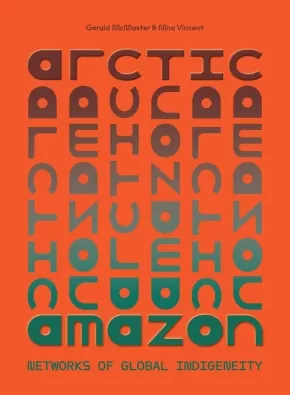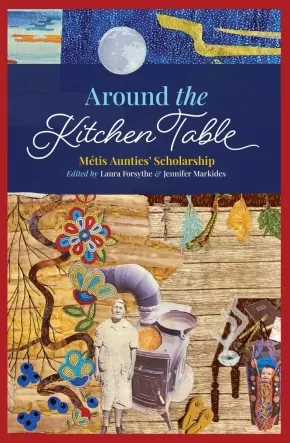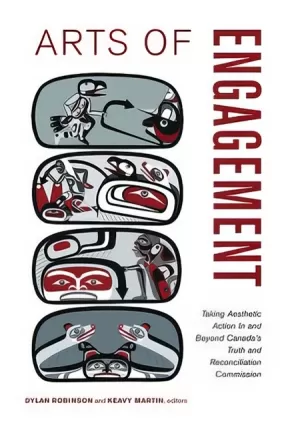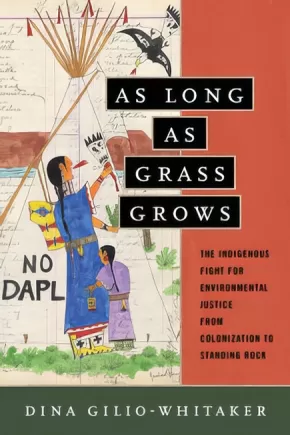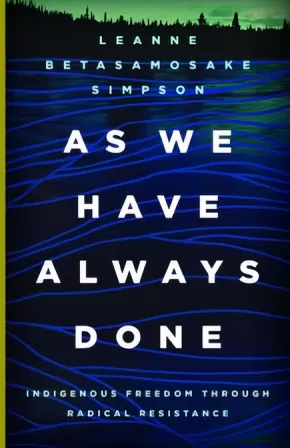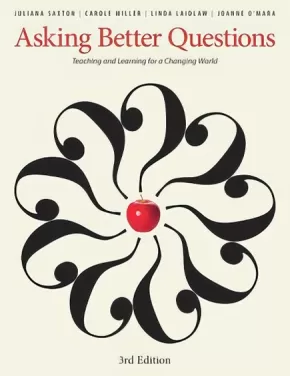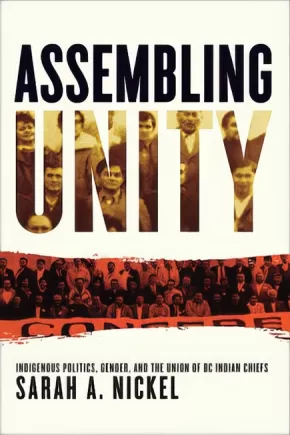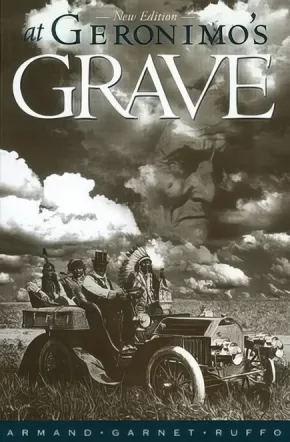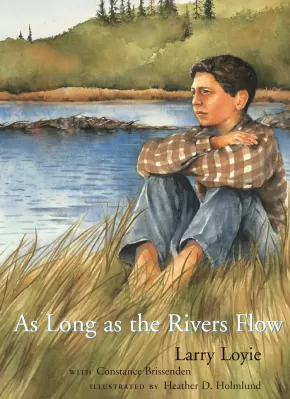
English
Books (11)
Arctic/Amazon: Networks of Global Indigeneity
$60.00
Editors:
Format:
Hardcover
Text Content Territories:
Indigenous Canadian; Indigenous South American;
Grade Levels: 12; University/College;
ISBN / Barcode: 9781773102993
Synopsis:
Synopsis:
Arctic/Amazon: Networks of Global Indigeneity offers a conversation between Indigenous Peoples of two regions in this time of political and environmental upheaval. Both regions are environmentally sensitive areas that have become hot spots in the debates circling around climate change and have long been contact zones between Indigenous Peoples and outsiders — zones of meeting and clashing, of contradictions and entanglement.
Opening with an Epistolary Exchange between the editors, Arctic/Amazon then widens to include essays by 12 Indigenous artists, curators, and knowledge-keepers about the integration of spirituality, ancestral respect, traditional knowledges, and political critique in artistic practice and more than 100 image reproductions and installation shots. The result is an extraordinary conversation about life, artistic practise, and geopolitical realities faced by Indigenous peoples in regions at risk.
Additional Information
256 pages | 8.87" x 12.12" | Hardcover
Around the Kitchen Table: Métis Aunties' Scholarship
$27.95
Editors:
Format:
Paperback
Text Content Territories:
Indigenous Canadian; Métis;
Reading Level: N/A
ISBN / Barcode: 9781772840735
Synopsis:
Synopsis:
Honouring the scholarship of Métis matriarchs
While surveying the field of Indigenous studies, Laura Forsythe and Jennifer Markides recognized a critical need for not only a Métis-focused volume, but one focused on the contributions of Métis women. To address this need, they brought together work by new and established scholars, artists, storytellers, and community leaders that reflects the diversity of research created by Métis women as it is lived, considered, conceptualized, and re-imagined.
With writing by Emma LaRocque and other pioneers of Métis studies, Around the Kitchen Table looks beyond the patriarchy to document and celebrate the scholarship of Métis women. Focusing on experiences in post-secondary environments, this collection necessarily traverses a range of methodologies. Spanning disciplines of social work, education, history, health care, urban studies, sociology, archaeology, and governance, contributors bring their own stories to explorations of spirituality, material culture, colonialism, land-based education, sexuality, language, and representation. The result is an expansive, heartfelt, and accessible "community of Métis thought," as articulated by Markides.
Reverent and revelatory, this collection centres the strong aunties and grandmothers who have shaped Métis communities, culture, and identities with teachings shared in classrooms, auditoriums, and around the kitchen table.
Reviews
"Inspiring, healing, and future-facing, this long overdue book gives us valuable new insights into the histories and identities of Métis people." — Kim Anderson
"Around the Kitchen Table is an exciting and thought-provoking contribution to the fields of Métis Studies and Indigenous feminism. Reading this book is like sitting down to visit with a strong cup of tea and your favourite aunties. It will inspire readers to think about matriarchy in new and exciting ways, teaching us what it means to be Métis women, good relatives, and innovative scholars." — Cheryl Troupe
Educator Information
Other contributors: Jennifer Adese, Christi Belcourt, Hannah Bouvier, Rita Bouvier, Vicki Bouvier, Robline Davey, Leah Marie Dorion, Marilyn Dumont, Nicki Ferland, Chantal Fiola, Lucy Fowler, Chelsea Gabel, Janice Cindy Gaudet, Emily Haines, Shalene Jobin, Emma LaRocque, Amanda LaVallee, Lynn Lavallee, Avery Letendre, Kirsten Lindquist, Yvonne Poitras Pratt, Angela Rancourt, Lisa Shepherd, Allyson Stevenson, Kisha Supernant, Caroline Tait, Angie Tucker, Dawn Wambold
Table of Contents
Contributors
Foreword by Caroline Tait
The Work of Métis Women: An Introduction – Jennifer Markides
Part One: Identity
1. Brown Names – Marilyn Dumont
2. We Know Ourselves – Lisa Shepherd
3. Kaa-waakohtoochik: The Ones Who Are Related to Each Other – Vicki Bouvier
4. The Roots Always Remain: Reconnecting to Our Communities in the Twenty-First Century – Angie Tucker
5. For the Love of Place―Not Just Any Place: Selected Metis Writings – Emma Larocque
6. Coming Home through Métis Research – Allyson Stevenson
7. Valuing Métis Identity in the Prairies through a “5 R” Lens: Our Digital Storytelling Journey – Chelsea Gabel and Amanda LaVallee
8. Prenatal/Postpartum Ceremonies and Parenting as Michif Self-Determination – Chantal Fiola
9. Medicine Women – Jennifer Adese
10. Lii Michif – Lisa Shepherd
Part Two: Women in the Academy
11. Metis Women as Contributors to the Academy Despite Colonial Patriarchy – Laura Forsythe
12. Connecting to Our Ancestors Through Archaeology: Stories of Three Métis Women Academics – Kisha Supernant, Dawn Wambold, and Emily Haines
13. Métis Women Educating in the Academy – Yvonne Poitras Pratt and Jennifer Markides
14. Structural and Lateral Violence Toward Metis Women in the Academy – Lynn Lavallee
Part Three: Research Methodology
15. Métis Research and Relationality: Auntie Governance, the Visiting Way, and Kitchen Table Reflections – Kirsten Lindquist, Shalene Jobin, Avery Letendre
16. Lii Taab di Faam Michif/Metis Women’s Kitchen Table: Practicing Our Sovereignty – Cindy Gaudet and Angela Rancourt
17. Wahkotowin: An Approach to Indigenous (Land-Based) Education – Nicki Ferland
18. Kaa-natoonamaan taanshi chi-ishi-natoonikeeyaan: My Search for how to Research Things (in a Queer Métis paradigm) – Lucy Fowler
19. Differentiating Métis Feminism – Robline Davey
20. Celebrating the Wisdom of Our Métis Matriarchs: Sewing Our Wellness All Together—Kood Toot Aansamb – Leah Dorion, Janice Cindy Gaudet, Hannah Bouvier
21. if the land could speak – Rita Bouvier
Bibliography
Art – Christi Belcourt
Additional Information
200 pages | 6.00" x 9.00" | index, bibliography | Paperback
Arrows in a Quiver: From Contact to the Courts in Indigenous-Canadian Relations
$39.95
Format:
Paperback
Text Content Territories:
Indigenous Canadian;
ISBN / Barcode: 9780889776784
Synopsis:
Synopsis:
Written in an accessible style and ideal for classroom use, Arrows in a Quiver provides an overview of Indigenous-settler relations, including how land is central to Indigenous identity and how the Canadian state marginalizes Indigenous people. Illustrating the various “arrows in a quiver” that Indigenous people use to fight back, such as grassroots organizing, political engagement, and the courts, Frideres situates “settler colonialism” historically and explains why decolonization requires a fundamental transformation of long-standing government policy for reconciliation to occur. The historical, political, and social context provided by this text offers greater understanding and theorizes what the effective devolution of government power might look like.
Reviews
“A useful introduction to Indigenous issues, especially for post-secondary students in Canada.” —Jonathan Dewar, co-editor of Cultivating Canada: Reconciliation through the Lens of Cultural Diversity
Educator Information
Recommended for students in grade 12 or college/university.
Additional Information
320 pages | 6.00" x 9.00"
Arts of Engagement: Taking Aesthetic Action In and Beyond the Truth and Reconciliation Commission of Canada
$41.99
Editors:
Format:
Paperback
Text Content Territories:
Indigenous Canadian;
Grade Levels: University/College;
ISBN / Barcode: 9781771121699
Synopsis:
Synopsis:
Arts of Engagement focuses on the role that music, film, visual art, and Indigenous cultural practices play in and beyond Canada’s Truth and Reconciliation Commission on Indian Residential Schools. Contributors here examine the impact of aesthetic and sensory experience in residential school history, at TRC national and community events, and in artwork and exhibitions not affiliated with the TRC. Using the framework of “aesthetic action,” the essays expand the frame of aesthetics to include visual, aural, and kinetic sensory experience, and question the ways in which key components of reconciliation such as apology and witnessing have social and political effects for residential school survivors, intergenerational survivors, and settler publics.
This volume makes an important contribution to the discourse on reconciliation in Canada by examining how aesthetic and sensory interventions offer alternative forms of political action and healing. These forms of aesthetic action encompass both sensory appeals to empathize and invitations to join together in alliance and new relationships as well as refusals to follow the normative scripts of reconciliation. Such refusals are important in their assertion of new terms for conciliation, terms that resist the imperatives of reconciliation as a form of resolution.
This collection charts new ground by detailing the aesthetic grammars of reconciliation and conciliation. The authors document the efficacies of the TRC for the various Indigenous and settler publics it has addressed, and consider the future aesthetic actions that must be taken in order to move beyond what many have identified as the TRC’s political limitations.
Educator Information
This book would be useful for Art, Art & Politics, Social Science, and Indigenous Studies courses.
Additional Information
382 pages | 6.00" x 9.00" | 24 colour illustrations, 2 printed music items
Edited by Dylan Robinson and Keavy Martin
As Long as Grass Grows: The Indigenous Fight for Environmental Justice, from Colonization to Standing Rock (PB)
$23.00
Format:
Paperback
Text Content Territories:
Indigenous American; Native American;
Grade Levels: University/College;
ISBN / Barcode: 9780807028360
Synopsis:
Synopsis:
The story of Native peoples’ resistance to environmental injustice and land incursions, and a call for environmentalists to learn from the Indigenous community’s rich history of activism.
Through the unique lens of “Indigenized environmental justice,” Indigenous researcher and activist Dina Gilio-Whitaker explores the fraught history of treaty violations, struggles for food and water security, and protection of sacred sites, while highlighting the important leadership of Indigenous women in this centuries-long struggle. As Long As Grass Grows gives readers an accessible history of Indigenous resistance to government and corporate incursions on their lands and offers new approaches to environmental justice activism and policy.
Throughout 2016, the Standing Rock protest put a national spotlight on Indigenous activists, but it also underscored how little Americans know about the longtime historical tensions between Native peoples and the mainstream environmental movement. Ultimately, she argues, modern environmentalists must look to the history of Indigenous resistance for wisdom and inspiration in our common fight for a just and sustainable future.
Reviews
“Highly recommended for American Indian studies and environmental justice students and scholars.” —Library Journal
“The process of genocide, which began five centuries ago with the colonization of the Americas and the extermination of indigenous people, has now spread to the planetary level, pushing two hundred species per day to extinction and threatening the entire human species. Dina Gilio-Whitaker’s As Long as Grass Grows makes these connections, holding the seeds of resistance, the seeds of freedom, and the promise of a future.” —Vandana Shiva, author of Earth Democracy
“As Long as Grass Grows honors Indigenous voices powerfully and centers Indigenous histories, values, and experiences. It tells crucial stories, both inspiring and heartrending, that will transform how readers understand environmental justice. I know many readers will come away with new ideas and actions for how they can protect our planet from forces that seek to destroy some of our most sacred relationships connecting human and nonhuman worlds—relationships that offer some of the greatest possibilities for achieving sustainability.” —Kyle Powys White, associate professor, Michigan State University
“From Standing Rock’s stand against a damaging pipeline to antinuclear and climate change activism, Indigenous peoples have always been and remain in the vanguard of the struggle for environmental justice. As Long as Grass Grows could not be of more relevance in the twenty-first century. Gilio-Whitaker has produced a sweeping history of these peoples’ fight for our fragile planet, from colonization to the present moment. There is nothing else like it. Read and heed this book.” —Jace Weaver, author of Defending Mother Earth
“In As Long as Grass Grows, Gilio-Whitaker skillfully delineates the stakes—and the distinctive character—of environmental justice for Indigenous communities. Bold, extensive, accessible, and inspiring, this book is for anyone interested in Indigenous environmental politics and the unique forms of environmentalism that arise from Native communities. Indeed, as Gilio-Whitaker shows, these topics are intertwined with a pressing issue that concerns all people: justice for the very lands we collectively inhabit.” —Clint Carroll, author of Roots of Our Renewal
“As Long as Grass Grows is a hallmark book of our time. By confronting climate change from an Indigenous perspective, not only does Gilio-Whitaker look at the history of Indigenous resistance to environmental colonization, but she points to a way forward beyond Western conceptions of environmental justice—toward decolonization as the only viable solution.” —Nick Estes, assistant professor, University of New Mexico, and author of Our History Is the Future
“As Long as Grass Grows, in the way no other study has done, brilliantly connects historic and ongoing Native American resistance to US colonialism with the movement for environmental justice. This book helps teach us the central importance of Native theory and practice to transforming the radically imbalanced world that corporate capitalism has made into a world of balance through extended kinship with the social and natural environments on which human beings are dependent for life.” —Eric Cheyfitz, professor, Cornell University, and author of The Disinformation Age: The Collapse of Liberal Democracy in the United States
“This groundbreaking new book will ignite conversations about environmentalism and environmental justice. Dina Gilio-Whitaker’s beautifully written account of environmental politics compels readers to understand how Indigenous people and the nonhuman world are caught in the gears of settler colonialism—and how an indigenized environmental justice framework can powerfully reframe our debate and our relations to one another and to the natural world around us. As Long as Grass Grows is perfectly timed to offer a fresh and captivating take on some of our most urgent issues of environmental and social justice.” —Traci Voyles, author of Wastelanding: Legacies of Uranium Mining in Navajo Country
Educator Information
TABLE OF CONTENTS
Author’s Note
INTRODUCTION
The Standing Rock Saga
CHAPTER ONE
Environmental Justice Theory and Its Limitations for Indigenous Peoples
CHAPTER TWO
Genocide by Any Other Name
A History of Indigenous Environmental Injustice
CHAPTER THREE
The Complicated Legacy of Western Expansion and the Industrial Revolution
CHAPTER FOUR
Food Is Medicine, Water Is Life
American Indian Health and the Environment
CHAPTER FIVE
(Not So) Strange Bedfellows
Indian Country’s Ambivalent Relationship with the Environmental Movement
CHAPTER SIX
Hearts Not on the Ground
Indigenous Women’s Leadership and More Cultural Clashes
CHAPTER SEVEN
Sacred Sites and Environmental Justice
CHAPTER EIGHT
Ways Forward for Environmental Justice in Indian Country
Acknowledgments
Notes
Selected Bibliography
Index
Additional Information
224 pages | 5.99" x 8.98" | Paperback
As We Have Always Done: Indigenous Freedom Through Radical Resistance (1 in stock, in Reprint)
$26.99
Format:
Paperback
Text Content Territories:
Indigenous American; Indigenous Canadian;
Grade Levels: University/College;
ISBN / Barcode: 9781517903879
Synopsis:
Synopsis:
Across North America, Indigenous acts of resistance have in recent years opposed the removal of federal protections for forests and waterways in Indigenous lands, halted the expansion of tar sands extraction and the pipeline construction at Standing Rock, and demanded justice for murdered and missing Indigenous women. In As We Have Always Done, Leanne Betasamosake Simpson locates Indigenous political resurgence as a practice rooted in uniquely Indigenous theorizing, writing, organizing, and thinking.
Indigenous resistance is a radical rejection of contemporary colonialism focused around the refusal of the dispossession of both Indigenous bodies and land. Simpson makes clear that its goal can no longer be cultural resurgence as a mechanism for inclusion in a multicultural mosaic. Instead, she calls for unapologetic, place-based Indigenous alternatives to the destructive logics of the settler colonial state, including heteropatriarchy, white supremacy, and capitalist exploitation.
Awards
- Native American and Indigenous Studies Association's Best Subsequent Book 2017
Reviews
"This is an astonishing work of Indigenous intellectualism and activism—by far the most provocative, defiant, visionary, and generous of Leanne Betasamosake Simpson's impressive corpus to date."—Daniel Heath Justice (Cherokee Nation), University of British Columbia
"I have learned more about this battered world from reading Leanne Betasamosake Simpson than from almost any writer alive today. A dazzlingly original thinker and an irresistible stylist, Simpson has gifted us with a field guide not to mere political resistance but to deep and holistic transformation. It arrives at the perfect time."—Naomi Klein, author of The Shock Doctrine and This Changes Everything
"A remarkable achievement that illuminates what is possible when we engage in the revolutionary act of indigenous self-love, As We Have Always Done asks the simple question, ‘What if no one sided with colonialism?’ The many possible answers to that question are reflected in Leanne Betasamosake Simpson’s beautifully written book in which she kindly challenges indigenous people to reclaim their lives and bodies from the settler colonial state."—Sarah Deer (Muscogee [Creek] Nation), author of The Beginning and End of Rape
"Incisive. Unmitigated. Inspiring. Simpson gives no quarter to colonialism. No quarter to a nasty Western narrative. She provides a pure, Indigenous lens—a lens that the white man tried to kill and bury. This book is a reminder that they failed in that rotten endeavor. It belongs on every Canadian bookshelf. On every American coffee table. Simpson's words are an affirmation of Indigenous resilience and resolve."—Simon Moya-Smith (Lakota and Chicano), culture editor at Indian Country Media Network
"Leanne Betasamosake Simpson confronts colonialism from the perspective of indigenous nationhood, but goes beyond arguing for changes in politics, writing in a way that enacts changes in our thinking about politics."—Indian Country Today
"While her intended audience is other Indigenous peoples, I think non-Indigenous Canadians will find it inspiring as they take up her challenge of decolonization."—Watershed Sentinel
"As We Have Always Done is an in-depth look into indigenous resistance and what is possible when that resistance embraces indigenous culture. It gives us a glimmer of hope. Hope that there is another way to live. That we can forge relationships, be with each other, and live for much more than what neo-liberal capitalism tells us life is about."—The Collective
"This book will not only offer the Indigenous community much courage, but it will also open the eyes of many non-indigenous people. We have here not just a description of a state of affairs, but also a practical guide. A very important, successful publication."—Amerindian Research
"The book is essential for anyone studying any aspect of Indigenous decolonization, politics, law, and settler colonialism, and signals a vital shift away from current neoliberal discussions and policies of indigenization and reconciliation in order to rebuild and recover indigenous nationhoods."—Transmotion
Additional Information
320 pages | 5.50" x 8.50" | Paperback
Aski Awasis / Children of the Earth
$21.00
Format:
Paperback
Text Content Territories:
Indigenous Canadian;
ISBN / Barcode: 9781552663400
Synopsis:
Synopsis:
The adoption of Aboriginal children into non-Aboriginal families has a long and contentious history in Canada. Life stories told by First Nations people reveal that the adoption experience has been far from positive for these communities and has, in fact, been an integral aspect of colonization. In an effort to decolonize adoption practices, the Yellowhead Tribal Services Agency (YTSA) in Alberta has integrated customary First Peoples’ adoption practices with provincial adoption laws and regulations. Introducing this unique agency, the authors outline the history of First Nations adoptions and, through an interview with a YTSA Elder, describe the adoption ceremonies offered at YTSA. Themes that emerged from interviews with adoptive parents and youth who have been adopted through this new integrated practice are also explored, and important recommendations for policy and practice in First Nations adoption are offered.
Asking Better Questions: Teaching and Learning for a Changing World, 3rd Edition
$28.95
Format:
Paperback
ISBN / Barcode: 9781551383354
Synopsis:
Synopsis:
Teaching and learning for a changing world
How do we help students makes sense of our increasingly complex digital world? This third edition of this classic text shows teachers how to empower students with the skills they need to ask critical and reflective questions about the overwhelming amount of information around them.
Asking Better Questions offers comprehensive tools and strategies to promote critical thinking and discussion in the classroom and encourage engaged and empathetic listening. Stimulating activities throughout the book promote lifelong inquiry skills that will help teachers and students grow in the classroom and explore broader issues in the community beyond. Challenge your students to assume a deeper ownership of their learning, ask questions that are important to them, and care about the answers.
On Twitter: #ABQ3
Educator Information
For students 5 - 14.
Additional Information
160 Pages
asowacikanisa: A Guide to Small Metis Bags
$24.95
Format:
Paperback
Text Content Territories:
Indigenous Canadian; Métis;
ISBN / Barcode: 9781926795935
Synopsis:
Synopsis:
asowacikanisa: A Guide to Small Métis Bags is a continuation in the series of “how to” books on Métis material culture. This resource will guide you in the step-by-step process on how to create two different bags, a tobacco pouch and a sash bag, which were traditional utilitarian items used by the Metis. These bags are used today to carry traditional medicines and other treasured items. Complete with historical information, easy to follow instructions, detailed photos and accompanying DVD, this resource provides everything you need to know to make your own traditional bags. (Materials not included).
Educator Information
Grade Level: Secondary / Post Secondary / Adult
Additional Information
8" x 10" | 46 Pages
Assembling Unity: Indigenous Politics, Gender, and the Union of BC Indian Chiefs
$32.95
Format:
Paperback
Text Content Territories:
Indigenous Canadian;
Grade Levels: University/College;
ISBN / Barcode: 9780774837996
Synopsis:
Synopsis:
Established narratives portray Indigenous unity as emerging solely in response to the political agenda of the settler state. But unity has long shaped the modern Indigenous political movement. With Indigenous perspectives in the foreground, Assembling Unity explores the relationship between global political ideologies and pan-Indigenous politics in British Columbia through a detailed history of the Union of BC Indian Chiefs. Sarah Nickel demonstrates that the articulation of unity was heavily negotiated between UBCIC members, grassroots constituents, and Indigenous women’s organizations. This incisive work unsettles dominant political narratives that cast Indigenous men as reactive and Indigenous women as apolitical.
This book will appeal to scholars and students of history, BC studies, and Indigenous studies, particularly those with an interest in gender and politics. It will also find an audience among Indigenous communities, activists, and political leaders.
Reviews
"Assembling Unity is a much needed resource that should be read by those wanting to learn about the historical issues BC Indigenous communities have faced – the same issues we continue to raise with current Canadian governments with little improvement." - Francyne Joe, President of the Native Women’s Association of Canada and member of the Shackan First Nation
Educator Information
Related Topics: BC Studies, Indigenous Studies, Canadian History, Gender & Sexuality Studies, History, Regional Studies, Women's Studies.
Table of Contents
Beginnings
Part 1: Pan-Indigenous Unity
1 Unity: “United we stand, divided we perish”
2 Authority: “Ordinary Indians” and “the private club”
3 Money: “A blessing and a golden noose”
Part 2: A Philosophical Revolution and Competing Nationalisms
4 Refusal: “Empty words and empty promises”
5 Protest: Direct Action through “Militant May”
6 Sovereignty: “If you really believe that you have the right, take it!”
Reflections
Appendix
Notes
Bibliography
Index
Additional Information
236 pages | 6.00" x 9.00" | 1 b&w photo, 2 maps, 3 tables
At Geronimo's Grave
$18.00
Format:
Paperback
Text Content Territories:
Indigenous American; Native American; Apache; Chiricahua; Indigenous;
Reading Level: N/A
ISBN / Barcode: 9781989496350
Synopsis:
Synopsis:
Geronimo is probably the second-best-known Indigenous name, after Pocahontas. But the reality of the great Apache warrior's fate is little remembered. In At Geronimo's Grave, Armand Garnet Ruffo uses the Apache warrior's life as a metaphor for the lives of many of the abandoned Indigenous people on this continent. With affection and concern, award-winning poet Armand Garnet Ruffo uses straightforward language to examine the lives and experiences of people who struggle to make their way in a world that has no place for them, starting with Geronimo himself. Feared for his once-great prowess, the warrior horseman was reduced to wearing a top hat and riding in an early Ford Model T car, a grim caricature of assimilation into the dominant culture. The bitter irony of this fate echoes through the personal poems in At Geronimo's Grave. This collection is a love letter to a people trapped in the slow-moving vehicle of another culture that is taking them nowhere.
Reviews
"Armand Ruffo spins silky songs out of everyday language. They thread the separations between the dead and the living, between the heirs of Columbus and his 'Indians,' between families and their children, joining the awkward edges always with hope, often with beauty." – Daniel David Moses
Additional Information
116 pages | 6.00" x 9.00" | Paperback
Teen Books (1)
As I Enfold You in Petals
$23.95
Artists:
Format:
Paperback
Text Content Territories:
Indigenous Canadian; First Nations; Dene; Tlicho (Dogrib);
ISBN / Barcode: 9781774920411
Synopsis:
"A glimmer of light and a welcome perspective for a culture growing beyond its challenges. As I Enfold You in Petals brings a strength of spirit, a deep connection to the past and a belief in a better tomorrow for First Nations people."— Troy Little, Eisner-nominated creator Angora Napkin.
Synopsis:
Newly sober, Curtis searches for healing in the ancient cultural practices of his Tłıcho Dene grandfather. But will the Little People answer his call?
Curtis has returned to Fort Smith, six weeks sober. He doesn’t have any sober friends, his mom’s still drinking, and his best friend (and secret crush) Lacey probably is too. Still, he’s determined to abstain from alcohol and help his people. Along the way, he might just be able to help himself.
Louis, Curtis’s late grandfather, was a healer. Legend has it, Louis made a deal with the Little People that gave him the power to heal. No one has heard from the Little People since Louis’s death, but his cabin may hold the key for them to return. There’s only one problem: Benny the Bank stands in the way.
An infamous bootlegger, Benny has profited off Fort Smith’s pain for decades. After being critically wounded in an attempt on his life, Benny knows he doesn’t have much time before the poison in his blood takes him. He also happens to own Louis’s cabin.
Can Curtis convince Benny to return the home that once belonged to Louis? Will the Little People answer Curtis’s call? And can Benny find a way to make amends and leave a legacy he can be proud of?
A stunning, fast-paced graphic novel, As I Enfold You in Petals will keep readers riveted until the last page.
Reviews
"It is a delight to have such a positive depiction of Dene spirituality and the people in this superb story of hope, strength of spirit, and redemption. The story celebrates family connections, memories, and stories through the text and the stunningly illustrated and colored illustrations." — No Flying No Tights blog
"A glimmer of light and a welcome perspective for a culture growing beyond its challenges. As I Enfold You in Petals brings a strength of spirit, a deep connection to the past and a belief in a better tomorrow for First Nations people."— Troy Little, Eisner-nominated creator Angora Napkin.
"Richard Van Camp has done it again! Van Camp brings the spiritual into our modern world in this gripping tale of redemption, overcoming adversity, and finding one's path along the way. An amazing story with equally rich and striking visuals."— Brandon Mitchell, author of Giju's Gift
Educator & Series Information
This book is part of the The Spirit of Denendeh series.
The publisher recommends this title for ages 12+
Caution: Substance Abuse, Drugs, Alcohol
Additional Information
72 pages | 6.50" x 10.00" | Paperback
Kids Books (3)
Arctic Vehicles - Nunavummi Reading Series (3 in Stock)
$8.95
Format:
Paperback
Text Content Territories:
Indigenous Canadian; Inuit;
ISBN / Barcode: 9781772668759
Synopsis:
Synopsis:
What kinds of vehicles do people use in the North?
This non-fiction book introduces children to some of the means of transportation Nunavummiut use in the Arctic.
Educator Information
This book is part of the Nunavummi Reading Series, a Nunavut-developed series that supports literacy learning while teaching readers about the people, traditions, and environment of the Canadian Arctic. It is a Level 9 book in the series.
Nunavummi Reading Series books have also been officially levelled using the Fountas & Pinnell Text Level Gradient™ Levelling System. This book's F&P Level is J.
Curriculum Connections: Language and literacy; Diversity; Indigenous perspectives; History; Heritage.
Recommended for ages 5-7.
Additional Information
20 pages | 6.00" x 8.00"
As Long As the Rivers Flow (PB)
$12.99
Artists:
Format:
Paperback
Text Content Territories:
Indigenous Canadian; First Nations; Cree (Nehiyawak);
ISBN / Barcode: 9780888996961
Synopsis:
Synopsis:
In the 1800s, the education of First Nations children was taken on by various churches, in government-sponsored residential schools. Children were forcibly taken from their families in order to erase their traditional languages and cultures.
As Long as the Rivers Flow is the story of Larry Loyie's last summer before entering residential school. It is a time of learning and adventure. He cares for an abandoned baby owl and watches his grandmother make winter moccasins. He helps the family prepare for a hunting and gathering trip.
Sequel: Goodbye Buffalo Bay
Awards
- In 2006, As Long As the Rivers Flow was the award recipient for First Nation Communities Read.
- Winner of the Norma Fleck Award for Canadian Children's Non-Fiction
Educator Information
Recommended for ages 7 to 11.
Curriculum Connections: Indigenous Studies, Social Studies, Science and Nature.
This resource is also available in French: Tant que couleront le rivieres.
Additional Information
48 pages | 7.25" x 10.25"
Askemawso
$14.95
Format:
Paperback
ISBN / Barcode: 9781998223305
Synopsis:
Synopsis:
The story follows a wəlastəkewi skitap (man) named Askəmawsit along with his friends, Mahtəkwehs and Kahkakohs. It is the story of his quest of finding long lost Kelowəskap, in hopes that he can grant Askəmawsit’s biggest wish to live forever.
Educator Information
Recommended for ages 5 to 8.
Additional Information
36 pages | 9.25" x 7.25" | Paperback

